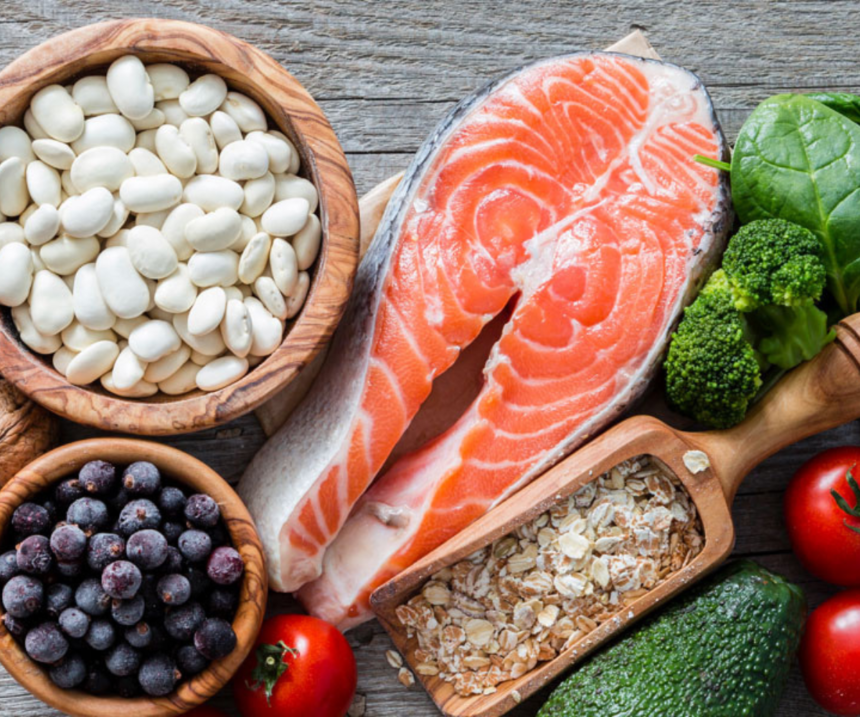Introduction: Food as a Path to Clearer Vision
When people think of eating healthy, they often imagine glowing skin, better energy, and heart protection. Yet few realize that diet also plays a profound role in eye health. The eyes, just like the brain or the heart, need essential nutrients to function optimally. Research increasingly shows that the Mediterranean diet for eye health is one of the most effective eating patterns for preventing vision loss and promoting lifelong visual clarity.

The Mediterranean diet, inspired by the traditional eating habits of countries like Greece, Italy, and Spain, emphasizes fresh vegetables, fruits, legumes, whole grains, nuts, fish, and healthy fats—especially olive oil. This plant-rich approach is not only heart-healthy but also vision-friendly, thanks to its abundance of antioxidants, omega-3 fatty acids, and anti-inflammatory compounds that nourish the eyes and reduce the risk of diseases like age-related macular degeneration (AMD), cataracts, and glaucoma.
What Is the Mediterranean Diet?
The Mediterranean diet is more than a meal plan—it’s a lifestyle. It revolves around natural, minimally processed foods, moderate portions, and mindful eating habits that focus on balance rather than restriction.
The key elements of this diet include:
- Vegetables: Especially leafy greens like spinach, kale, and broccoli.
- Fruits: Oranges, berries, and pomegranates that are high in vitamins and antioxidants.
- Whole Grains: Brown rice, quinoa, oats, and barley.
- Nuts and Seeds: Almonds, pistachios, walnuts, and sunflower seeds for vitamin E.
- Fish and Seafood: Salmon, sardines, and mackerel rich in omega-3s.
- Healthy Oils: Olive and canola oil as primary fats instead of butter.
- Limited Red Meat and Processed Foods: Encouraging lean proteins and plant-based meals.
This dietary pattern reflects harmony between health and taste. It not only supports a strong heart and brain but also helps maintain the small, delicate structures inside the eyes that are responsible for sight.
The Mediterranean Diet and Its Connection to Eye Health
Scientific studies across Europe and other parts of the world have revealed that people who follow a Mediterranean-style diet have a significantly lower risk of developing AMD and other vision-threatening conditions.
A major reason behind this is the anti-inflammatory nature of the diet. Inflammation plays a central role in retinal degeneration and damage to the macula—the part of the eye responsible for sharp, central vision. By reducing inflammation and oxidative stress, the Mediterranean diet protects photoreceptor cells from damage and supports retinal health.
Key Nutrients in the Mediterranean Diet for Eye Health
a. Omega-3 Fatty Acids
Fish such as salmon, sardines, tuna, and mackerel are excellent sources of omega-3s. These healthy fats are vital for maintaining the fluidity of cell membranes in the retina and preventing dry eye syndrome. Omega-3s also reduce inflammation, improving circulation to the optic nerve.
b. Lutein and Zeaxanthin
These carotenoids, found in spinach, kale, and other leafy greens, form a protective layer in the retina, absorbing harmful blue light and reducing oxidative stress. They play a vital role in preventing macular degeneration.
c. Vitamin C
Citrus fruits, tomatoes, and bell peppers are rich in vitamin C, a potent antioxidant that helps protect eye tissues from free radical damage and supports healthy blood vessels in the retina.
d. Vitamin E
Nuts, seeds, and olive oil are great sources of vitamin E, which protects cell membranes in the eyes from oxidative stress. It’s especially beneficial in reducing the risk of cataract formation.
e. Zinc and Selenium
Zinc supports vitamin A absorption and contributes to proper night vision. Selenium helps neutralize free radicals that can damage eye tissues.
The Science Behind Diet and Vision Protection

A series of European studies have consistently shown that a diet rich in fruits, vegetables, fish, and whole grains—and lower in red meat and processed foods—correlates with a reduced risk of advanced macular degeneration.
In one study, individuals who consumed at least 150 grams (5 ounces) of fruit daily had a 15% lower risk of developing AMD. Another study found that participants with the highest adherence to the Mediterranean diet were far less likely to experience vision loss compared to those with low adherence.
The reason lies in antioxidants and polyphenols, which reduce oxidative stress, protect retinal cells, and support overall ocular metabolism.
The Role of Antioxidants in Eye Protection
Antioxidants are compounds that combat free radicals—unstable molecules that cause cell damage. The retina, due to constant exposure to light and oxygen, is particularly vulnerable to oxidative stress. Foods like tomatoes, carrots, oranges, and green vegetables in the Mediterranean diet act as natural shields for the eyes.
Polyphenols in olive oil and resveratrol in red grapes further enhance this protection by improving blood circulation to the retina and strengthening the tiny capillaries that supply the eye.
Fruits and Vegetables That Support Eye Health
Eating a rainbow of produce ensures the body receives a variety of vision-protective nutrients.
- Leafy Greens: Kale, spinach, and collard greens contain high levels of lutein and zeaxanthin.
- Orange and Yellow Veggies: Carrots, sweet potatoes, and corn are rich in beta-carotene, a precursor to vitamin A.
- Berries and Citrus Fruits: Provide vitamin C and anthocyanins, which enhance night vision.
- Tomatoes and Red Peppers: Contain lycopene, which helps prevent macular damage.
The Power of Olive Oil
Olive oil, a cornerstone of the Mediterranean diet, contains monounsaturated fats and polyphenols that reduce inflammation and oxidative damage. Regular use of extra virgin olive oil not only benefits the heart but also enhances tear film stability and supports overall eye comfort.
The Importance of Fish and Seafood
Fish are a direct source of DHA (docosahexaenoic acid), a type of omega-3 fatty acid that forms part of the retina. Regular fish consumption supports proper retinal structure and reduces the risk of retinal vessel disorders.
Replacing red meat with fish just two to three times per week can have a measurable impact on long-term vision protection.
Whole Grains, Nuts, and Legumes: The Unsung Heroes

These foods maintain balanced blood sugar levels, which is critical because fluctuations in glucose can damage the retina over time. Diabetic retinopathy, one of the leading causes of vision loss, can be mitigated by stabilizing blood sugar through complex carbohydrates and plant-based proteins.
Foods to Avoid for Optimal Eye Health
While the Mediterranean diet encourages abundance, it also promotes moderation. To protect your eyes:
- Limit processed foods high in salt and sugar.
- Reduce red and processed meat intake.
- Avoid trans fats found in fried or fast foods.
- Moderate dairy and butter consumption.
These foods contribute to oxidative stress and inflammation, both linked to retinal degeneration.
Lifestyle Habits That Boost Eye Health
Beyond food, certain habits amplify the benefits of a Mediterranean diet:
- Stay Active: Exercise improves blood flow to the eyes.
- Get Enough Sleep: Allows ocular tissues to rest and repair.
- Protect Eyes from UV Rays: Wear sunglasses outdoors.
- Stay Hydrated: Keeps tear film balanced and prevents dryness.
Meal Plan Example: Mediterranean Eating for the Eyes
| Meal | Example |
|---|---|
| Breakfast | Greek yogurt topped with nuts, berries, and honey |
| Lunch | Mixed green salad with olive oil, grilled chicken, and lentils |
| Snack | Sliced cucumber, almonds, and green tea |
| Dinner | Baked salmon, quinoa, and steamed spinach |
| Dessert | Fresh orange or a handful of grapes |
This balanced approach ensures your daily intake supports both overall health and strong vision.
Preventing Age-Related Eye Diseases
The Mediterranean diet helps protect against multiple conditions:
- AMD: Lutein, zeaxanthin, and omega-3s shield the macula.
- Cataracts: Antioxidants delay lens clouding.
- Diabetic Retinopathy: Fiber and whole grains regulate blood sugar.
- Dry Eye: Omega-3s and hydration maintain moisture balance.
Transitioning to a Mediterranean Diet
Shifting to this diet doesn’t have to be difficult. Start small:
- Replace butter with olive oil.
- Choose fish over red meat twice weekly.
- Snack on fruits or nuts instead of chips.
- Make vegetables the centerpiece of each meal.
Gradual changes ensure long-term adherence and sustainable results.https://www.youtube.com/watch?v=vP2jAslDf-E
The Broader Health Benefits
Adopting a Mediterranean diet benefits not just the eyes but the entire body:
- Improves heart health
- Supports brain function
- Reduces inflammation
- Promotes healthy aging
The same nutrients that protect the retina also keep the heart strong and the mind sharp.
Conclusion: A Vision-Friendly Way of Living

The Mediterranean diet for eye health is more than a nutritional plan—it’s a lifelong commitment to wellness. By embracing a colorful, nutrient-rich, and balanced eating style, individuals can protect their sight, slow down age-related eye changes, and enjoy vibrant vision well into later years.
Healthy eyes begin on your plate—so let every meal be a step toward clearer vision and a brighter future.




